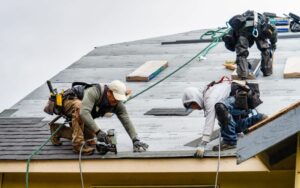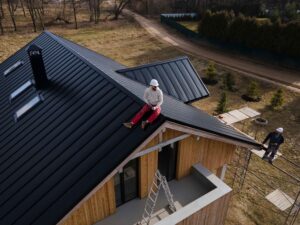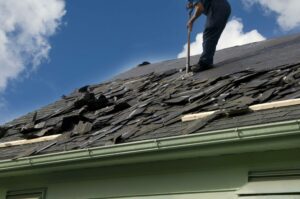When considering the cost to check your roof, you’ll find a range that typically spans from $120 to $600, depending on the inspection type. Basic visual inspections are more affordable, while advanced methods like infrared scans can greatly increase the price. Understanding what’s included in these inspections is essential, as it can impact your decision. Let’s explore what factors influence these costs and how they can ultimately protect your investment.
Understanding Roof Inspection Costs
Understanding roof inspection costs is essential for homeowners looking to maintain the integrity of their property. The average cost ranges from $120 to $600, with a national average around $250 to $300. Several factors influence these costs, including roof size, type, pitch, and accessibility. Basic visual inspections usually cost between $120 and $250, while more advanced methods like infrared inspections can reach $600 or more. Drone inspections, ranging from $250 to $500, offer thorough analyses of hard-to-reach areas. The complexity of your roof considerably impacts the inspection duration and expertise required. By comprehending these costs, you can make informed decisions about the necessary inspections to safeguard your home’s condition.
What Does a Roof Inspection Include?
A thorough roof inspection encompasses several critical components that guarantee the longevity and integrity of your roofing system. During a basic visual inspection, you’ll receive an assessment of visible damage, while advanced methods like infrared and drone inspections reveal hidden issues such as moisture and insulation problems. Inspectors utilize moisture meters and infrared cameras to detect leaks and heat loss, ensuring no detail goes unnoticed. You’ll receive a detailed report summarizing findings, complete with photographic evidence highlighting problem areas. Recommendations for repairs or maintenance will also be provided, including estimated costs. This extensive approach not only identifies current issues but also prevents future complications, ensuring your roof remains in prime condition for years to come.
How Often Should You Get a Roof Inspection?
How frequently should you schedule a roof inspection? Generally, it’s recommended to inspect your roof at least once a year. However, if you live in areas with severe weather conditions, consider increasing this frequency to twice a year. After major storms or hail events, an immediate inspection is advisable to identify any potential damage. Additionally, if your roof is older or has experienced repairs, more frequent inspections can help detect issues early. Basic visual inspections suffice for regular checks, but more advanced methods like infrared or drone inspections may be necessary for complex roofs or hidden problems. By staying proactive, you can prevent minor issues from escalating into costly repairs, ensuring your roof’s longevity and your home’s integrity.
Is a Roof Inspection Worth the Cost?
Is it really worth investing in a roof inspection? Absolutely. For an average cost of $250 to $300, you gain invaluable insight into your roof’s condition. A basic visual inspection identifies visible damage, while advanced methods like infrared or drone inspections reveal hidden issues, potentially saving you thousands in future repairs. By detecting problems early, you prevent minor issues from escalating. Different roof types and sizes influence inspection costs; however, the investment pays off through detailed reports that outline necessary repairs and cost estimates. This proactive approach not only extends your roof’s lifespan but also enhances your home’s overall health and value. In short, a roof inspection is a wise investment for any homeowner.
How to Save on Roof Inspection Costs
Investing in a roof inspection is a smart move for homeowners, but finding ways to save on those costs can enhance the benefits even further. Start by opting for a basic visual inspection, which typically ranges from $120 to $250, to assess visible damage without the higher costs associated with advanced methods. Additionally, consider scheduling inspections during off-peak seasons when contractors may offer discounted rates. If your roof is straightforward in design, you may avoid additional fees associated with steep pitches or complex layouts. Finally, maintaining open communication with your inspector can help you understand which services are necessary, preventing overspending on unnecessary advanced inspections. Proactive steps like these can greatly lower your overall inspection costs.
Choosing the Right Roof Inspection Company
When it comes to selecting the right roof inspection company, what should you prioritize to guarantee a thorough evaluation? First, consider the company’s expertise and reputation. Look for specialized services in various inspection types, such as basic visual or advanced methods like infrared and drone inspections. Ascertain they provide detailed reports that highlight findings and recommended actions. Evaluate their use of modern tools, as advanced technology enhances assessment accuracy. Don’t forget to ask about follow-up services and availability for questions post-inspection. Cost is important, but focus on value and quality over the lowest price. Finally, read customer reviews to gauge satisfaction and reliability to make an informed choice for your roof’s health.
Frequently Asked Questions
What Qualifications Should I Look for in a Roof Inspector?
When choosing a roof inspector, look for certifications, extensive experience, and positive reviews. Ascertain they’re familiar with your roof type and can provide detailed reports, highlighting potential issues and necessary repairs for your peace of mind.
Can I Inspect My Roof Myself?
You can inspect your roof yourself, but you should prioritize safety. Look for visible damage, missing shingles, or sagging areas. Use binoculars for a closer view, and guarantee you follow local regulations regarding roof inspections.
Are There Hidden Costs Associated With Roof Inspections?
Yes, there can be hidden costs during roof inspections. You’ll want to contemplate potential additional fees for repairs, equipment, or specialized services. Always clarify what’s included in the inspection to avoid unexpected expenses later.
How Long Does a Typical Roof Inspection Take?
A typical roof inspection takes about 30 to 90 minutes, depending on your roof’s size and complexity. During this time, inspectors assess materials, identify damage, and evaluate overall integrity to guarantee your roof’s longevity.
What Happens if My Roof Fails Inspection?
If your roof fails inspection, you’ll typically receive a detailed report outlining necessary repairs. You’ll need to address these issues promptly to guarantee safety, maintain property value, and prevent further damage from water infiltration.




